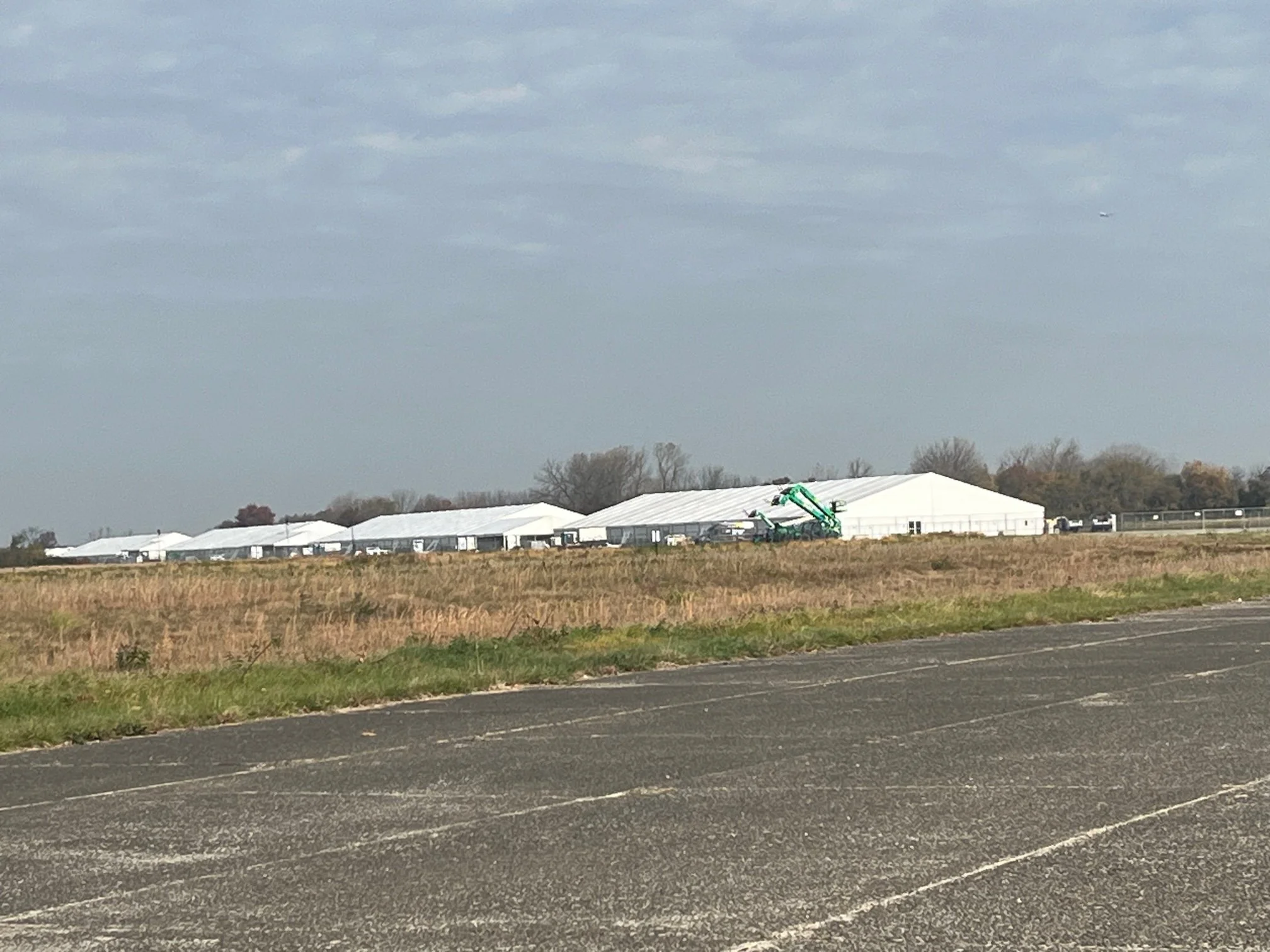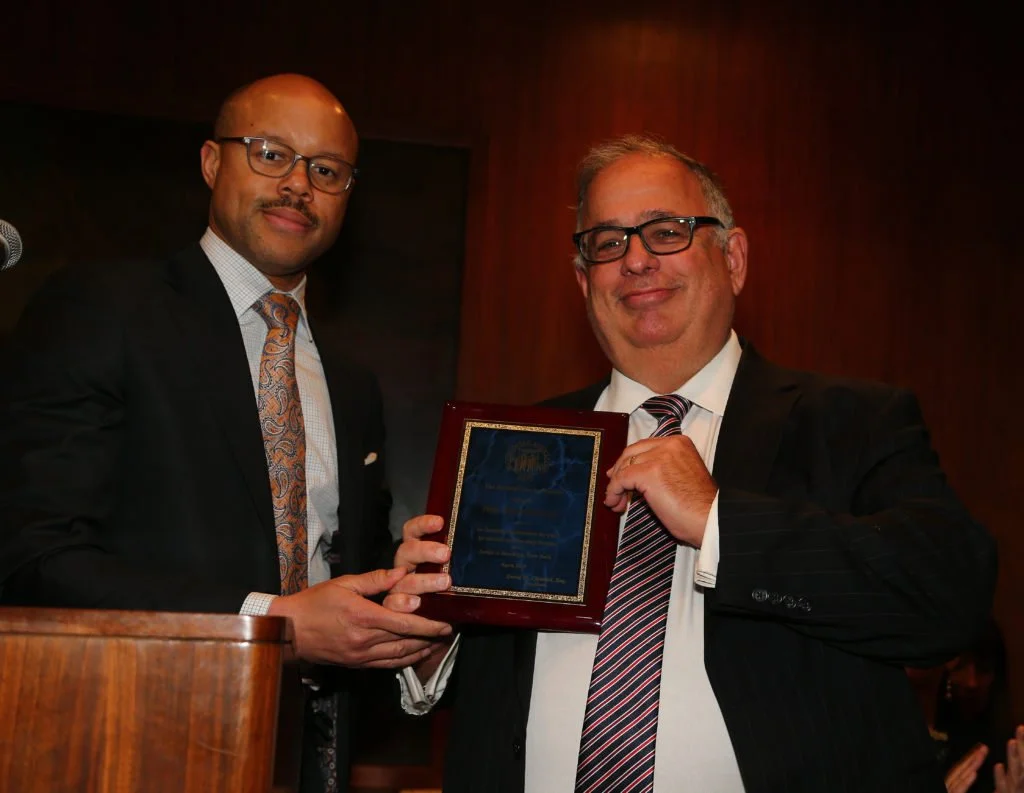Court dismisses Floyd Bennett shelter case brought by Queens pol
/A Brooklyn judge ruled to dismiss the case brought by Queens and Brooklyn local electeds against the migrant shelter at Floyd Bennett Field. Eagle photo by Ryan Schwach
By Ryan Schwach
A Brooklyn judge this week tossed out an effort from Queens and South Brooklyn lawmakers to get the city and state to shut down its migrant tent shelter at Floyd Bennett Field.
Judge Peter Sweeney from Kings County Supreme Court, Civil Term issued the ruling to throw out the injunction on Wednesday, saying the court found the petitioner’s arguments to be “unavailing” across the board.
The case was filed in September of last year following the announcement from the city and the state that they would be using Floyd Bennett Field – which was once a naval base – to house 2,000 migrant families with children. The challenge to the shelter was brought by Queens Councilmember Joann Ariola, Brooklyn Assemblymember Jaime Williams and a number of community members in both lawmakers’ districts.
In his 35-page decision, released publicly on Thursday, Sweeney one by one shot down the petitioner’s arguments, including the idea the filers had the right to argue the case at all.
Sweeney ruled that the case was a “political dispute” and not centered around the financial, tax-based reasoning the petitions argued.
“It is clear that the dispute between petitioners and the state and city respondents over the migrant shelter at Floyd Bennett Field is not about the fiscal activities of either entity,” court documents say. “Indeed, no one disputes that the state and city have the authority to spend funds to establish [shelter] for the homeless population.”
“The petitioners have failed to meet their threshold burden of establishing they have standing to maintain this proceeding,” he continued.
Sweeney also argued that the petitioners themselves could not prove that they were harmed by the use of Floyd Bennett Field as a migrant shelter site.
The court called the assertion there would be an impact to essential services or environmental impacts to the site or the petitioner’s neighborhoods “speculative.”
“Petitioners have failed to offer any support for the proposition that the placement of a maximum of 2,000 migrant asylum seekers at Floyd Bennett Field will have any measurable impact upon the provision of vital services to the surrounding areas or could otherwise interfere with the evacuation plan for the Rockaways.”
Ariola and the other petitioners also argued that the use of the site as a migrant shelter was adverse to the legally allowed uses of Floyd Bennett Field, another argument shot down by the court.
In his decision, Sweeney said they had no standing to raise claims that the migrant shelter would negatively affect the environment around Floyd Bennett or that the shelter violates zoning laws.
Williams, a Democrat, and Ariola, a Republican, both expressed their displeasure with the ruling on Wednesday.
“We are extremely disappointed to learn of Judge Sweeney’s decision to dismiss our case in the Floyd Bennett Field lawsuit,” said Ariola. “We will continue to do what we can to push for an immediate closure of the tent complex at Floyd Bennett Field.”
Williams went as far as to call the ruling a “disgrace.”
“I am appalled by Judge Sweeney's decision to dismiss our case, and disgusted to learn that he did so without notifying either party or the public,” said Williams.
Kings County Supreme Court, Civil Term Judge Peter Sweeney (right) ruled in a 35-page decision on Wednesday dismissing an attempt from Queens and Brooklyn lawmakers to get a migrant shelter at Floyd Bennett Field shut down. Eagle file photo
“We would love to know why he feels it is prudent to place 2,000 human beings in a flood zone in the middle of a National Recreation Area,” she added. “This is a disgrace and an insult to every tax paying citizen whom resides in the area around Floyd Bennett Field, and a disservice to the people who are being forced to live in this compound.”
Ariola further told the Eagle that there may be more litigation against the shelter to come.
"We still need to reconvene with our counsel and discuss on our path forward,” said Ariola. “An appeal is not out of the question, but we have not yet decided on how we want to proceed."
City Hall, on the other hand, applauded the ruling, which will allow them to maintain the tent shelter at Floyd Bennett Field as the migrant crisis continues.
“New York City continues to lead the nation in handling this national humanitarian crisis, with more than 60 percent of the nearly 183,000 migrants that have come through our intake system since the spring of 2022 taking the next step in their journey,” a spokesperson said.
“But, as we have said repeatedly, with 218 emergency sites and hundreds of new arrivals coming to New York City every day, we are simply out of good options,” they added. “Floyd Bennett Field has been one tool in our very limited toolbox for sheltering hundreds of migrant families with children every night, and this ruling ensures they will not have to relocate. We continue to advocate for additional support from our state and federal partners and ask our elected partners to join us.”
The case was first brought in September, and went through some fluctuations before it was finally ruled on.
Initially, the petitioners brought the case in Staten Island’s courts, then upon request of the city’s lawyers, the case was moved to federal court in October.
The attorneys said that the injunction cited federal law, while the petitioners called the move a delaying tactic.
The case eventually made it to Brooklyn, where Floyd Bennett Field resides, a move the petitioners said was to get the best outcome for the city.
“What we've seen from the start of our suit has been a series of delaying tactics from city and state lawyers,” Ariola said on Thursday. “They bounced us from court to court, buying time and burning through tax dollars until they finally landed in a place where they would have the greatest advantage."
The governor’s office did not respond to the Eagle’s request for a response to the ruling on Thursday.
Beyond the lawsuit, the shelter has seen a few other moments of controversy.
When the shelter first opened in November, several of the first families to arrive almost immediately got back onto the bus that had taken them to the remote location and requested to be taken to a shelter elsewhere.
Additionally, THE CITY reported that in December, several families staying at the shelter attempted to leave after a strong storm appeared to shake the tent structure holding the nearly 2,000 migrants.
About a month later, all families staying at the shelter were evacuated ahead of a powerful January storm.





